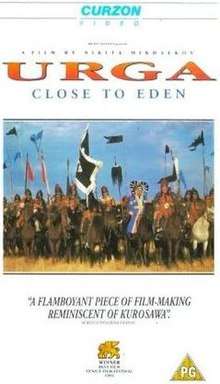Close to Eden
Urga (Russian: У́рга — территория любви, Urga — territoriya lyobvi; "Urga — Territory of Love") is a 1991 film by Russian director Nikita Mikhalkov. It was released in North America as Close to Eden. It depicts the friendship between a Russian truck driver and a Mongolian shepherd in Inner Mongolia. The film was an international co-production between companies based in Russia and France.
| Urga Close to Eden | |
|---|---|
 DVD cover | |
| Directed by | Nikita Mikhalkov |
| Produced by | Michel Seydoux Jean-Louis Piel René Cleitman |
| Written by | Rustam Ibragimbekov Nikita Mikhalkov |
| Starring | Bayaertu Badema Vladimir Gostyukhin |
| Music by | Eduard Artemyev |
| Cinematography | Vilen Kalyuta |
| Edited by | Joëlle Hache |
Production company | Aria Caméra One Centre National de la Cinématographie Hachette Première Ministry of Culture and Communications Studio Trite Union Générale Cinématographique |
| Distributed by | Miramax |
Release date |
|
Running time | 118 minutes |
| Country | Soviet Union |
| Language | Mongolian Russian Mandarin |
Plot
Gombo, a Mongolian shepherd, lives in a yurt in Inner Mongolia with his wife, three children, and mother. They are portrayed as unsophisticated and traditional people. Gombo desires sexual intercourse with his wife, which puts his wife at unease due to Chinese law as it is likely to result in a fourth child. Shortly after, Sergei, an intoxicated, buffoonish Russian truck driver, has stranded himself by driving his truck into a river, and is picked up by Gombo, taken to his family's yurt, to join him in dinner. Gombo's family are particularly taken with Sergei's back tattoos, later revealed to be music notation for the popular waltz "On the Hills of Manchuria." Gombo and Sergei become mutually dependent despite their language and cultural differences. Gombo and Sergei go into the nearest city together, where Gombo is supposed to buy condoms; buying a television set and other goods, but not contraceptives. Sergei, a former army bandsman, becomes drunk and sings "On the Hills of Manchuria" in a nightclub, with the band playing from tattoos on his back. He is arrested and bailed out of jail by Gombo's uncle who lives in the city.
Gombo returns home, and along the way stops to eat. He has a strange dream featuring his drunk, horseback-riding relative as Genghis Khan and his wife as the Khan's wife. In the dream both he and Sergei are captured and killed, while the TV set is destroyed. Gombo awakes from his dream and arrives home with the TV. He and his family switch between watching a broadcast of the President of the USA and a badly sung variety show. Gombo's wife, although saddened when learning that he bought no condoms, leaves the yurt, inviting him to follow her with a gesture. Gombo follows her out onto the prairie, sticking an urga (a long stick with a lasso on the end used to capture animals) into the ground in a traditional signal that a couple is being intimate. A voiceover from Gombo's fourth son, who was conceived at this time, concludes the film, and a chimney belching smoke now stands where Gombo placed his urga.
Cast
- Badema as Pagma, Gombo's wife / Genghis Khan's wife
- Bayaertu as Gombo
- Vladimir Gostyukhin as Serguei, Russian truck driver
- Baoyinhexige as Bajartou, local weirdo / Genghis Khan
- Bao Yongyan as Bourma, Gombo's daughter
- Wurinile as Bouin, Gombo's son
- Babouchka as Babouchka, Gombo's mother
- Wang Biao as Wang Biao, pianist
- Bao Jinsheng
- Nikolai Vachtchiline as Nikolai, Serguei's friend
- Larisa Kuwnetsova as Marina, Serguei's wife
- Jon Bochinski as Stanislas
- Nikita Mikhalkov as cyclist
Awards
Urga won the Golden Lion at the Venice Film Festival and Best European Film at the European Film Awards. It was also nominated for an Academy Award for Best Foreign Film,[1] and for a Golden Globe in the same category.
Influence
The film is credited with sparking Czech writer Petra Hůlová's initial interest in Mongolia, leading to study, then an exchange year in Ulan Bator, and then to her first novel, Paměť mojí babičce (2002; literally "in memory of my grandmother"), in English translation published as All This Belongs to Me (2009, Northwestern University Press).[2]
In the first section of Michelangelo Antonioni's film Beyond the Clouds, the two protagonists reunite at a screening of Close to Eden.[3]
See also
- List of submissions to the 65th Academy Awards for Best Foreign Language Film
- List of Russian submissions for the Academy Award for Best Foreign Language Film
References
- "The 65th Academy Awards (1993) Nominees and Winners". oscars.org. Retrieved 19 September 2015.
- Allen, Lisette, "Telling a foreign tale in a foreign tongue" Archived August 5, 2011, at the Wayback Machine, Prague Post, September 30, 2009. Retrieved 2011-06-27.
- http://www.jonathanrosenbaum.net/2000/04/return-to-beauty/